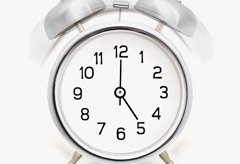Why the biological clock ticks loudly for women aged 30
The first ever study to track a woman's supply of eggs from conception to the menopause is causing a stir

The first ever study to track a woman's supply of eggs from conception to the menopause is causing a stir
With more women than ever choosing to fulfill their career dreams before starting a family, this news is bound to hit hard: the average woman has just 12% of her eggs left - barely an eighth - by the time she turns 30.
The discovery been highlighted by the first ever study to track a woman's supply of eggs from conception to the menopause, and the speed at which these eggs decline.
According to this research, by the time a woman turns 40 she is left with just 3% of the two million eggs she was born with. The more eggs a woman has, the greater the odds of one maturing enough to allow her to fall pregnant.
Dr Tom Kelsey, who took part in the research at St Andrew University, said: ‘Women often do not realise how seriously ovarian reserve declines after the age of 35. Every year that goes by you are losing a big proportion of your ovarian reserve.
‘A lot of people get to their menopause in their mid or late 40s. It is only the average that goes to 50 or 51.'
The results contradict other controversial theories that ovaries contain stem cells that replenish a woman's supply of eggs as she gets older. Instead, the number is fixed at birth.
Celebrity news, beauty, fashion advice, and fascinating features, delivered straight to your inbox!
But don't panic just yet. Just because a woman is over 40 doesn't mean she needs to give up all hope of having a baby.
There is a simple blood test that a gynecologist or fertility specialist can order to help determine whether there's an adequate reserve of eggs to allow for a reasonable chance of becoming pregnant.
The test checks the level of FSH and Estradiol, and should be carried out on the 2nd, 3rd or 4th day of the menstrual cycle. Speak to your GP for more details.